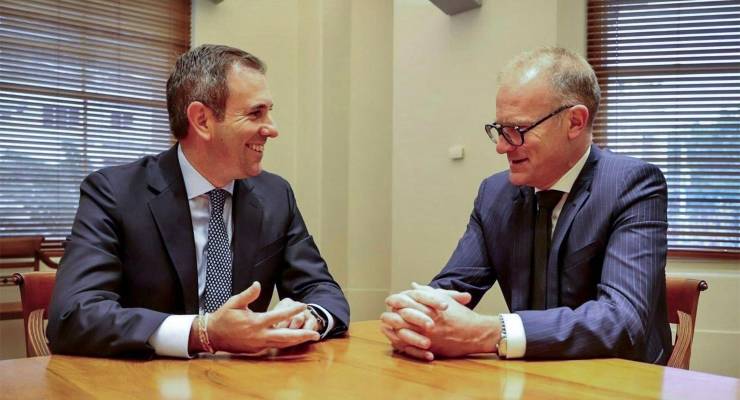
It was July 2018, and the Turnbull government — shortly before it was blown up by Peter Dutton — had just appointed veteran Liberal staffer Phil Gaetjens to head Treasury under Scott Morrison, as well as Mathias Cormann’s former chief of staff, Simon Atkinson, as deputy secretary. Another Treasury deputy secretary, former Nick Minchin staffer Michael Brennan, had been moved over to replace Peter Harris as chair of the Productivity Commission.
Labor’s then-Treasury spokesman Chris Bowen was furious: “Morrison sneaking out highly political appointments to the Productivity Commission and Treasury late last Friday afternoon was nothing short of a disgrace.
“There are serious questions to be answered around the so-called panel process that led to Mr Michael Brennan’s appointment to the chair of the Productivity Commission.”
Yesterday it was Labor’s turn. Treasurer Jim Chalmers appointed Chris Barrett, chief of staff to treasurer Wayne Swan from 2007-10 and Chalmers’ former boss, to head the Productivity Commission after a “rigorous process”. Not a word about “highly political appointments”.
The leadership of the Productivity Commission matters. It’s one of the few sources of genuinely independent policy advice within the federal government, especially after the Coalition tainted Treasury, along with much of the public service, with partisan and right-wing appointments.
To be fair to Brennan — whose period as chair encompassed the pandemic, meaning a slower tempo of output from the commission — there was no drift to the right on his watch, or reversion to the grim era of hardline neoliberal Gary “purge the rottenness out of the system” Banks. The commission proved as willing to discuss climate change as it had been under Harris, called bullshit on the Nationals pork-barrelling irrigators with “infrastructure” funding, and reported on the huge benefits of investing in early intervention and community support to improve mental health.
There was little of the usual right-wing “reform” agenda of industrial relations deregulation and company tax cuts, and Brennan proved a lower-profile chair than either Harris or Banks — again, hampered by the pandemic. So if the goal of his appointment was, as some of us might have thought, to bring the commission in line with the then-government, it failed.
Like Brennan, Barrett has had a mix of stints in both state and federal public services at senior levels, political staffing jobs and a gig at a major consulting firm (Boston Consulting Group for Barrett; PwC for Brennan). He also spent most of the 2010s in Europe, first as an OECD ambassador and then in Germany at the European Climate Foundation. Despite the strong CV, Barrett’s Labor links raise the question of whether he will fall into line with Labor’s agenda or maintain the commission’s policy independence.
Two crucial areas will offer guidance on that.
On climate, an area of expertise for Barrett, Labor is manifestly failing to respond to the accelerating climate emergency, with unambitious abatement targets, clunky mechanisms (just this week, the commission noted that the best carbon abatement mechanism was an economy-wide tax), and an apparently unlimited willingness to expand Australia’s exports of fossil fuels. The climate crisis — courtesy of floods, fires, droughts and heatwaves — is already one of the biggest economic and fiscal challenges facing the country, leaving a major potential role for the commission to push for much more aggressive policy by the Commonwealth.
The other is protectionism. Despite a brief flirtation with economic rationalism under Tony Abbott, both sides are significantly more protectionist than any government since the Fraser years, and Labor has embraced its most protectionist manufacturing policy since the 1980s. One example: yesterday in western Sydney, the federal and NSW governments held a “roundtable” on rail manufacturing to map out “a plan to restore and strengthen this critical industry”.
As always, the use of the word “critical”, like “strategic” or “security”, in relation to any industry should ring alarm bells. Federal Labor went to the last election committed to a “national rail manufacturing plan”, unveiled by Albanese in 2020. NSW Labor Leader Chris Minns went further in committing his party to a 50% local content rail procurement plan.
But we’re not the only country going for some rail protectionism. The Biden administration is throwing more than US$60 billion at rail manufacturing with the goal of high-speed trains being manufactured locally, and state and city governments are handing out millions in subsidies to multinational rail manufacturing companies such as Siemens to establish plants in their states.
As with the car industry, the likely result of trying to lure or retain rolling stock and rail equipment manufacturing to Australia is taxpayer subsidies being handed to multinationals such as Siemens, which already has two manufacturing plants here, all so we can boast we build our own trains rather than buy them from other countries dumb enough to subsidise them.
If the Productivity Commission under Barrett is prepared to call out this nonsense, we’ll have a good indication that its independence is intact.








Crikey is committed to hosting lively discussions. Help us keep the conversation useful, interesting and welcoming. We aim to publish comments quickly in the interest of promoting robust conversation, but we’re a small team and we deploy filters to protect against legal risk. Occasionally your comment may be held up while we review, but we’re working as fast as we can to keep the conversation rolling.
The Crikey comment section is members-only content. Please subscribe to leave a comment.
The Crikey comment section is members-only content. Please login to leave a comment.